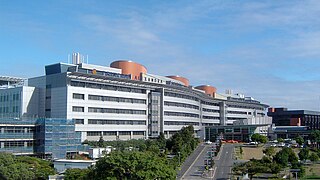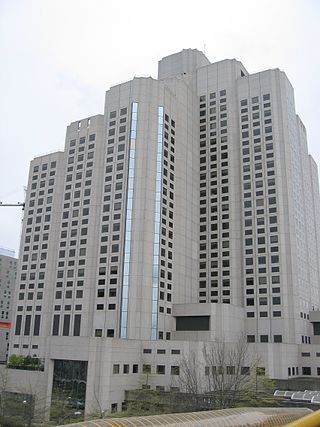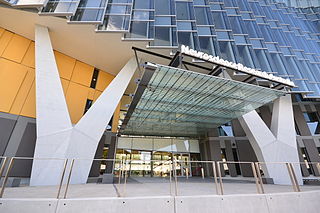Queensland University of Technology (QUT) is a public research university located in the urban coastal city of Brisbane, Queensland, Australia. QUT is located on two campuses in the Brisbane area viz. Gardens Point and Kelvin Grove. The university in its current form was founded in 1989, when the Queensland Institute of Technology (QIT) was made a university through the Queensland University of Technology Act 1988, with the resulting Queensland University of Technology beginning its operations from January 1989. In 1990, the Brisbane College of Advanced Education merged with QUT.

Leiden University Medical Center or LUMC is the university hospital affiliated with Leiden University, of which it forms the medical faculty. It is located in Leiden, Netherlands. LUMC is a modern university medical center for research, education and patient care. Its research practice ranges from pure fundamental medical research to applied clinical research.

The Princess Alexandra Hospital (PAH) is a major Australian teaching hospital of the University of Queensland, located in Brisbane, Queensland. It is a tertiary level teaching hospital with all major medical and surgical specialities onsite except for obstetrics, gynaecology, paediatrics, and medical genetics. It has a catchment population of 1.6 million people with 1038 beds and 5,800 full-time equivalent staff. In 2005, the hospital received Magnet Recognition.

The University of Texas Health Science Center at San Antonio is a public academic health science center in San Antonio, Texas. It is part of the University of Texas System.
The QIMR Berghofer Medical Research Institute is an Australian medical research institute located in Herston, Brisbane, in the state of Queensland. QIMR was established in 1945 by the Government of Queensland through the enactment of the Queensland Institute of Medical Research Act 1945 (Qld). Previously known as the Queensland Institute of Medical Research (QIMR), the original purpose of the institute was to further the study of tropical diseases in North Queensland. The current director is Professor Fabienne Mackay. The institute is a registered charity. In 2021, the institute was named as one of the Queensland Greats by the Queensland Government.

Sunnybrook Health Sciences Centre (SHSC), commonly known as Sunnybrook Hospital or simply Sunnybrook, is an academic health science centre located in Toronto, Ontario, Canada. It is the largest trauma centre in Canada and one of two trauma centres in Toronto, the other being St. Michael's Hospital. Sunnybrook is a teaching hospital fully affiliated with the University of Toronto. The hospital is home to Canada's largest veterans centre, in the Kilgour Wing and the George Hees, which cares for World War II and Korean War veterans.

Vancouver General Hospital is a medical facility located in Vancouver, British Columbia. It is the largest facility in the Vancouver Hospital and Health Sciences Centre (VHHSC) group of medical facilities. VGH is Canada's third largest hospital by bed count, after Hamilton General Hospital, and Foothills Medical Centre.
The Kolling Institute is located in the grounds of the Royal North Shore Hospital in St Leonards, Sydney Australia. The institute, founded in 1920, is the oldest medical research institute in New South Wales.

Sree Chitra Tirunal Institute for Medical Sciences & Technology (SCTIMST), Trivandrum, is an Institution of National Importance established by an Act of Parliament in 1980. It is under the aegis of Department of Science and Technology, Government of India, with an Institute Body and a Governing Body constituted as per the provisions of the Sree Chitra Tirunal Institute for Medical Sciences & Technology, Trivandrum, Act, 1980. The Institute presents a unique model by connecting the different strands of Biomedical Technology ,Clinical Medicine and Public Health to produce a seamless continuum of indisputable relevance to society.

The Cambridge Biomedical Campus is the largest centre of medical research and health science in Europe. The site is located at the southern end of Hills Road in Cambridge, England.

The Centre for Neuroscience and Cell Biology (CNC) is a nonprofit research institute founded in 1990, aiming to foster research in biomedicine and biotechnology and multidisciplinary graduate teaching at the University of Coimbra. CNC was the first established “Laboratório Associado” in Portugal, and it has steadily increased the scope of scientific competences over the years, with a strong focus on the exploitation of the fundamental mechanisms of ageing and brain diseases.

The Centre for Accident Research and Road Safety - Queensland (CARRS-Q) is a research centre established in 1996.

Neuroscience Research Australia is an independent medical research institute based in Sydney, Australia. Previously called the Prince of Wales Medical Research Institute, the institute relaunched as Neuroscience Research Australia on 1 June 2010. NeuRA is accredited by the National Health and Medical Research Council.
The Australian Institute of Tropical Health and Medicine (AITHM) is an Australian tropical health and medical research institute based at James Cook University (JCU) in Townsville and Cairns, Queensland. Formerly known as the Australian Institute of Tropical Medicine, AITHM was established at JCU in 2008.
Pamela J. Russell was an Australian academic researcher of immunology, bladder and prostate research. Russell was awarded Membership of the Order of Australia (AM) for her research on prostate and bladder cancer in 2003.
Judith Ann Clements is an Australian academic and educator, specializing in Kallikrein proteases in prostate and ovarian cancers. Clements is the scientific director at the Australian Prostate Cancer Research Centre – Queensland and was head of the Cancer Research Program at the Institute of Health and Biomedical Innovation (IHBI) of Queensland University of Technology at the Translational Research Institute (Australia) from 1997–2014.

The Translational Research Institute (TRI) is Australia's first translational medical research institute dedicated to translating scientific discoveries into applications for medical practice.
Health Translation Queensland is the first Advanced Health Research Translation Centre in Queensland, Australia. The organisation’s purpose is to strengthen the linkages between healthcare, research and education in order to deliver better health outcomes for the community.

The Queensland Brain Institute (QBI) is an Australian neuroscience research institute, located in Brisbane at the St Lucia campus of The University of Queensland (UQ). Founding director Professor Perry Bartlett established the QBI in 2003 with assistance from The University of Queensland, Queensland State Government, and Chuck Feeney, founder of The Atlantic Philanthropies. The purpose-built facility was commissioned in 2004 and on 19 November 2007, the building was opened by former Queensland Premier Anna Bligh.
Professor David Wayne Johnson is an Australian nephrologist known for kidney treatments and transplants in Australia. In 2009 he was a Queensland State Finalist for Australian of the Year, for his work in the early recognition and care of people with chronic kidney disease and specifically for his work in detection of chronic kidney disease.












